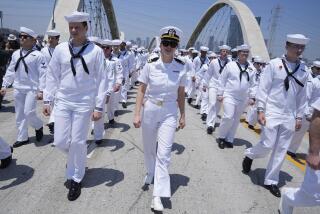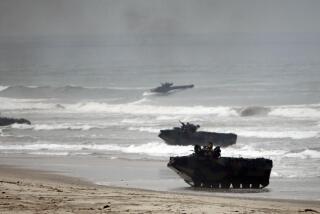Delayed Gulf War Troops Return to Camp Pendleton : Homecoming: Joyous relatives and friends are on hand to welcome the Marines and sailors, who had been diverted to typhoon-ravaged Bangladesh.
- Share via
CAMP PENDLETON — Lt. Cmdr. Nathaniel Bryant stood with his gear in a dark loading bay of the amphibious assault ship Tarawa, anchored off Oceanside on Saturday morning. It had been seven months since Bryant had shipped out to the Persian Gulf--seven months since he had seen his wife and children.
“Seven months is a long time,” Bryant said just before boarding a helicopter that would ferry him to shore for a reunion with his family.
He was among 3,500 members of the 5th Marine Expeditionary Brigade who returned home Saturday in one of the last major homecomings of troops to the West Coast. Meeting the Marines and sailors were parents, wives, girlfriends, children and other relatives and friends carrying flags, banners and yellow balloons. About 2,200 members of the brigade remain aboard five ships in the Gulf.
The 5th Marine Expeditionary Brigade was supposed to have returned earlier but was delayed after the troops were diverted to Bangladesh. The seven-ship brigade delivered emergency supplies after the April 30 typhoon that resulted in 140,000 deaths and left hundreds of thousands homeless.
The delay in returning to Southern California meant that the troops participated in the big welcome-home parades only by television, said Bryant, originally from Miami.
“We don’t know what is going to happen (for us) since we’ve gotten back kind of late,” he said. “I don’t know if there are going to be any parades, but these guys deserve it.”
The 5th Marine Expeditionary Brigade is heralded for conducting the major feint of the Persian Gulf War.
By preparing to storm the heavily mined and heavily defended beaches of Kuwait, the 7,000 Marines kept six divisions of Iraq’s best troops occupied, Brig. Gen. Peter J. Rowe said in a Saturday morning briefing for reporters aboard the Tarawa. Rowe is the brigade’s commanding general.
The deception probably saved the lives of many other ground troops who invaded Kuwait and Iraq in the main thrust on the lightly defended western borders, Rowe said.
But the 5th Marine Expeditionary Brigade wasn’t always meant as a decoy.
“What we were told, and what our mind-set was when we left San Diego, was we are going to assault the beach . . . the most heavily defended beaches in the annals of history,” Rowe said. “More heavily defended than Normandy.”
During the 44 days needed to reach the Gulf, the brigade planned and practiced the beach assault, first in Hawaii and then in the Philippines. The Marines were ready to land at any of 14 sites along the Kuwaiti coast, Rowe said. Plans were prepared “right down to a gnat’s eyelash in terms of detail,” he said.
“I was scared,” Wright said aboard the Tarawa. “I didn’t know what to expect. What they told us is we’d be landing at a beach filled with mines and everything else.”
The mood aboard the ship, he said, was tense. As the ships circled outside Kuwait, smoke from huge oil-well fires made 3 p.m. look like midnight, Wright said. The Marines would receive orders on some days to don desert camouflage gear and prepare to invade. A few hours later, those orders would be canceled, he said.
The 5th Marine Expeditionary Brigade didn’t spend all its time aboard ship. Once the ground war got under way, 4,000 of the Marines landed in northeastern Saudi Arabia on Feb. 24 to support another Marine unit in Kuwait.
The Marines hit the beach and spent the next 30 hours on the move, Rowe said. They secured the Al Jabber airfield and later met resistance in the Al Wafra Forest just south of Kuwait city. Two Marines were wounded, including Cpl. Brett Doggett of Mission Viejo, who lost one foot and part of the other after stepping on a land mine.
After serving in the Gulf, the brigade was ordered home May 7.
On the way, however, new orders came through for them to divert to Bangladesh for Operation Sea Angel, a massive effort to get food and fresh water to the citizens of the typhoon-ravaged country.
The orders got a mixed reaction from the crew.
“It was a worthwhile effort,” said Chief Warrant Officer Albert Andrews, “but we were ready to go home.”
Times staff writer Ray Tessler contributed to this report.
More to Read
Get the L.A. Times Politics newsletter
Deeply reported insights into legislation, politics and policy from Sacramento, Washington and beyond. In your inbox twice per week.
You may occasionally receive promotional content from the Los Angeles Times.








